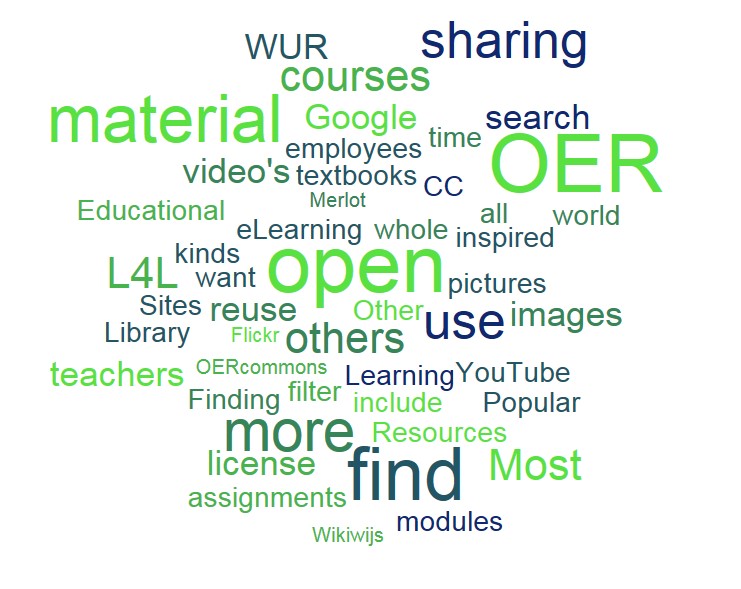Finding and Sharing Open Educational Resources (OER!)
Nowadays, teachers at the WUR use all sorts of digital material in their (Blackboard) courses. Most of the time, they make these materials themselves, however it gets more and more accepted to reuse the materials of others. While popular sites such as YouTube and Google jumpstarted the reuse and sharing of videos and pictures, other materials such as eLearning modules and assignments are also increasingly shared and reused. This is because teachers have found out that using others’ materials is time-efficient. Moreover, looking at the materials of others inspires them to modify and improve their own material.
Although sharing and reusing someone else’s material sounds nice, it does have a drawback: It is not always clear if you are allowed to reuse the material or not. Using copyright-protected material without permission might lead to fines or even result in a lawsuit. A solution to this problem is the use of “Open” Educational Resources (OER). OER are publically available and allow, sometimes to a certain extent, reuse in electronic learning environments. Most of the time an (open) licence tells you what you are allowed to do with the OER. For example, it might allow you to reuse it but without making derivatives, or it does not allow the reuse of the material for commercial purposes. Most commonly used is the Creative Commons License.
Where to find these OER?
We hope you are now inspired to use OER of others. But where do you find them? You probably know you can find videos on YouTube and Vimeo. But you can also find short video s (knowledge clips) on typical WUR topics in our own Library for Learning (L4L). You can also find images here. Other sources for images and pictures are Google Images, Flickr and BrandPortal. Open textbooks or study books can be found on Bookboon.com and via the Open Textbook Library. Overviews of complete open courses and Massive Online Open Courses (MOOCs) can be find via MOOC list, Class Central and edX. Sites such as Merlot, OERcommons or Wikiwijs include all sorts of material. Besides videos and textbooks, they include presentations, quizzes, assignments and eLearning modules. More OER databases can be found via our website.
s (knowledge clips) on typical WUR topics in our own Library for Learning (L4L). You can also find images here. Other sources for images and pictures are Google Images, Flickr and BrandPortal. Open textbooks or study books can be found on Bookboon.com and via the Open Textbook Library. Overviews of complete open courses and Massive Online Open Courses (MOOCs) can be find via MOOC list, Class Central and edX. Sites such as Merlot, OERcommons or Wikiwijs include all sorts of material. Besides videos and textbooks, they include presentations, quizzes, assignments and eLearning modules. More OER databases can be found via our website.
Most of the above-named search machines have options to filter or search only for material with an open (CC) license. For example, in the L4L you can filter by license, and in Google you can use the settings option to do an advanced search for specific usage rights. To avoid problems, use these tools and make sure you only use material that is really open. If you are uncertain if you can use the material, please contact us via the Servicedesk Library (+ 31 317 48 6666 or facilities.servicedesk@wur.nl).
Sharing your own OER
You might also have teaching material that you would like to share yourself. Maybe because you think it might be helpful to others, or perhaps because you are just proud of it. Don’t be afraid to open up the material! You can share your material in all kinds of ways. Sharing via email or closed network sites is already quite common, however, in these cases only a limited number of teachers in your own network will see your material. Consider sharing your material with the whole world using a (CC) license. You will reach a large teacher population, you can get credits and feedback on your material and you do not have to be afraid that your material is going to be misused, because the license defines exactly what others might do with it. Merlot, OERcommons and Wikiwijs are nice platforms to use for making your material available online to the whole world. You can also share your material through the L4L. Sharing through de L4L is a suitable option if you only want to share your material with WUR employees.
Need more help with finding or reusing OER? Or do you have questions about sharing your material(s) with WUR employees or the entire world? Please check our website, join our workshop: “Finding & Sharing Open Content for my Courses” on the 8th of March 2018 on 12.30 in PC0432 Forum or contact the Servicedesk Library (+ 31 317 48 6666 or facilities.servicedesk@wur.nl).

[…] There are many ways to find digital teaching materials on your topic. You can scroll around the drive of your department, you can ask other teachers in your community or just use Google, Flickr or YouTube. Another fancy way to do it, is searching repositories for educational material such as Library for Learning (with WUR content), Merlot (with material from all over the world) or Wikiwijs (with Dutch educational material). Using these repositories might be a better option than only using Google or Youtube because there is more variation in material, the context of the material is better described and sometimes the material is reviewed for educational quality (in Merlot for example). More tips on where and how to find material can be found on the webpage “finding open content” and in this blogpost on Finding and Sharing Open Education Resources (OER!). […]